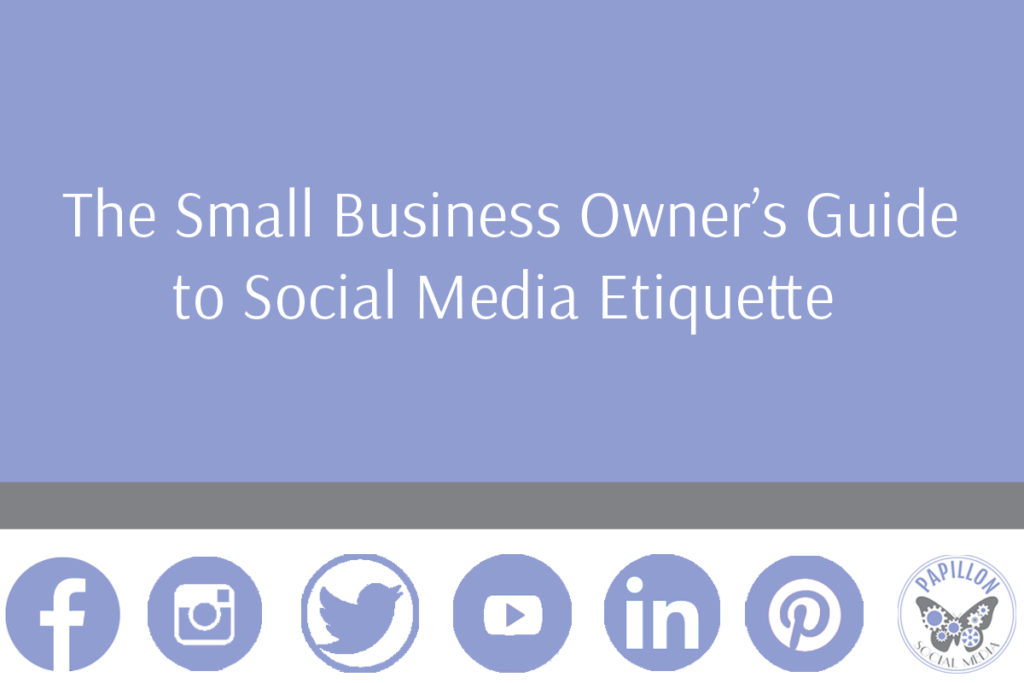Most small business owners (and people in general) have a basic understanding of etiquette and social norms. While we can’t all be Emily Post, generally, we do our best to treat each other with common courtesy out in the real world.
Online, however, many people and businesses are severely lacking. Yes, social media is fluid and always changing, but these basic premises are essentially timeless. Below is a list of some general social media etiquette guidelines for businesses- especially small/local businesses.

Do
Return follows/likes to those in your industry who follow you. For example, if you are a local wedding photographer and a local florist follows you on Twitter, follow them back. I know, I know, everyone wants to have more followers than people they are following, but I’m not saying you should follow back every fan or customer. It is a great way to connect with those in your industry, increase your networking opportunities and, you know, return the support that they have given you. Will it lead to cross promotion and a great working relationship? Perhaps. At the very least, it is the courteous thing to do.
If you are featured in an article, share it on your social media channels. If your bakery is highlighted on a food blog, share it with your fans! There is no reason not to do this, and I am shocked that more small business owners do not take advantage of this free and non self-promotional exposure. Of course, if the article is a scathing review, you may want to skip sharing it, but otherwise dooooooo eeeeeet.
Don’t
Publicly ask for shares. You should not do this even if you have a relationship with the person/business in question, but especially if you do not. If you own a dry cleaning business, do not tag “Small Business Laundry Soap” asking them to share your content. Why? Because it’s icky. I’m sure there is a better explanation for that, but anytime I see it, I just think, “EW.” However, if it is something applicable to their niche, there is nothing wrong with sending them a private message asking them to share, especially if you also offer to share some of their relevant content in return.
Spam! The crucial element that many marketers and business owners miss in Social Media Marketing is the social aspect of the equation. This means you are to engage and interact with your customers, not blow up everyone’s Facebook, Twitter and Instagram feed with self promotion. Every business is unique, as is every platform, so no one can tell you how much you should be posting. You are going to have to do your research, or hire us (or someone like us!) to research it for you. Posting your own material too much can and will affect your engagement and your online reputation.
Act rude toward other businesses on social media. I was shocked when I saw one local business owner create a passive aggressive tweet about another local business. I have no idea the history behind the rude statement, nor if the offended party had even had a right to be upset, but I can assure you, they were foolish to take it to social media in that manner; a customer may have to get online to move a company into action, but business to business, handle that stuff privately. Otherwise, it makes you look unprofessional, petty, and it may cost you sales, or even your reputation.
Steal content. I can’t believe I have to include this, but alas. Do not steal other people’s content. Some examples of content theft:
- Posting an image you did not create and not giving proper credit
- Putting your name on an article you did not write
- Sharing any social media update without crediting the author
- Rewording an article you find online (pretty sure they call that plagiarism)
While content theft does happen by people who are trying to be malicious, most often it is because well intentioned business owners simply do not understand the “rules” of social media. It’s new and uncharted. I understand. Again, this is why a social media manager is almost essential. Though sadly, I’ve seen so-called social media managers break these rules on a regular basis.
These guides are by no means an exhaustive list, rather a great place to start start. Implementing these rules will help improve your social media presence, and help establish your online credibility.
 We’ll keep you to date with the latest social media trends, any specials we may have and give you free tips on social media management! We promise never to spam.
We’ll keep you to date with the latest social media trends, any specials we may have and give you free tips on social media management! We promise never to spam.